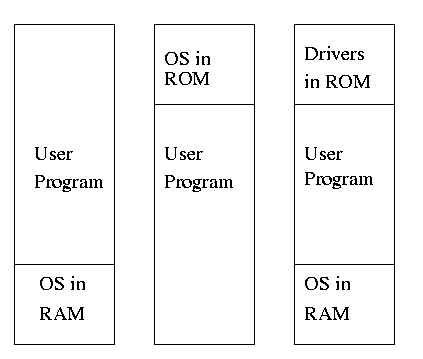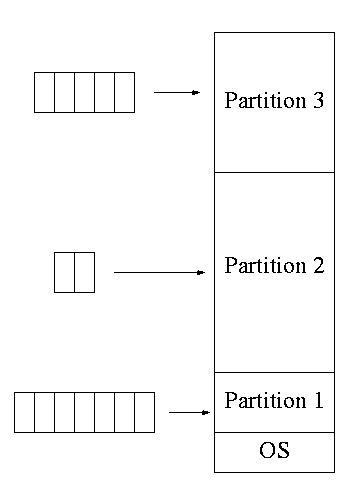Operating Systems
================ Start Lecture #13 ================
Chapter 4: Memory Management
Also called storage management or
space management.
Memory management must deal with the storage
hierarchy present in modern machines.
- Registers, cache, central memory, disk, tape (backup)
- Move data from level to level of the hierarchy.
- How should we decide when to move data up to a higher level?
- Fetch on demand (e.g. demand paging, which is dominant now).
- Prefetch
- Read-ahead for file I/O.
- Large cache lines and pages.
- Extreme example. Entire job present whenever running.
We will see in the next few weeks that there are three independent
decision:
- Segmentation (or no segmentation)
- Paging (or no paging)
- Fetch on demand (or no fetching on demand)
Memory management implements address translation.
- Convert virtual addresses to physical addresses
- Also called logical to real address translation.
- A virtual address is the address expressed in
the program.
- A physical address is the address understood
by the computer hardware.
- The translation from virtual to physical addresses is performed by
the Memory Management Unit or (MMU).
- Another example of address translation is the conversion of
relative addresses to absolute addresses
by the linker.
- The translation might be trivial (e.g., the identity) but not in a modern
general purpose OS.
- The translation might be difficult (i.e., slow).
- Often includes addition/shifts/mask--not too bad.
- Often includes memory references.
- VERY serious.
- Solution is to cache translations in a Translation
Lookaside Buffer (TLB). Sometimes called a
translation buffer (TB).
Homework: 6.
When is address translation performed?
- At compile time
- Compiler generates physical addresses.
- Requires knowledge of where the compilation unit will be loaded.
- No linker.
- Loader is trivial.
- Primitive.
- Rarely used (MSDOS .COM files).
- At link-edit time (the “linker lab”)
- Compiler
-
Generates relative (a.k.a. relocatable) addresses for each
compilation unit.
-
References external addresses.
- Linkage editor
- Converts the relocatable addr to absolute.
- Resolves external references.
-
Misnamed ld by unix.
-
Must also converts virtual to physical addresses by
knowing where the linked program will be loaded. Linker
lab “does” this, but it is trivial since we
assume the linked program will be loaded at 0.
-
Loader is still trivial.
-
Hardware requirements are small.
-
A program can be loaded only where specified and
cannot move once loaded.
-
Not used much any more.
- At load time
-
Similar to at link-edit time, but do not fix
the starting address.
-
Program can be loaded anywhere.
-
Program can move but cannot be split.
-
Need modest hardware: base/limit registers.
-
Loader sets the base/limit registers.
-
No longer common.
- At execution time
- Addresses translated dynamically during execution.
- Hardware needed to perform the virtual to physical address
translation quickly.
- Currently dominates.
- Much more information later.
Extensions
- Dynamic Loading
- When executing a call, check if module is loaded.
- If not loaded, call linking loader to load it and update
tables.
- Slows down calls (indirection) unless you rewrite code dynamically.
- Not used much.
- Dynamic Linking
- The traditional linking described above is today often called
static linking.
- With dynamic linking, frequently used routines are not linked
into the program. Instead, just a stub is linked.
- When the routine is called, the stub checks to see if the
real routine is loaded (it may have been loaded by
another program).
- If not loaded, load it.
- If already loaded, share it. This needs some OS
help so that different jobs sharing the library don't
overwrite each other's private memory.
- Advantages of dynamic linking.
- Saves space: Routine only in memory once even when used
many times.
- Bug fix to dynamically linked library fixes all applications
that use that library, without having to
relink the application.
- Disadvantages of dynamic linking.
- New bugs in dynamically linked library infect all
applications.
- Applications “change” even when they haven't changed.
Note: I will place ** before each memory management
scheme.
4.1: Basic Memory Management (Without Swapping or Paging)
Entire process remains in memory from start to finish and does not move.
The sum of the memory requirements of all jobs in the system cannot
exceed the size of physical memory.
** 4.1.1: Monoprogramming without swapping or paging (Single User)
The “good old days” when everything was easy.

- No address translation done by the OS (i.e., address translation is
not performed dynamically during execution).
- Either reload the OS for each job (or don't have an OS, which is almost
the same), or protect the OS from the job.
- One way to protect (part of) the OS is to have it in ROM.
- Of course, must have the OS (read-write) data in ram.
- Can have a separate OS address space only accessible in
supervisor mode.
- Might just put some drivers in ROM (BIOS).
- The user employs overlays if the memory needed
by a job exceeds the size of physical memory.
- Programmer breaks program into pieces.
- A “root” piece is always memory resident.
- The root contains calls to load and unload various pieces.
- Programmer's responsibility to ensure that a piece is already
loaded when it is called.
- No longer used, but we couldn't have gotten to the moon in the
60s without it (I think).
- Overlays have been replaced by dynamic address translation and
other features (e.g., demand paging) that have the system support
logical address sizes greater than physical address sizes.
- Fred Brooks (leader of IBM's OS/360 project and author of “The
mythical man month”) remarked that the OS/360 linkage editor was
terrific, especially in its support for overlays, but by the time
it came out, overlays were no longer used.

**4.1.2: Multiprogramming with fixed partitions
Two goals of multiprogramming are to improve CPU utilization, by
overlapping CPU and I/O, and to permit short jobs to finish quickly.
- This scheme was used by IBM for system 360 OS/MFT
(multiprogramming with a fixed number of tasks).
- Can have a single input queue instead of one for each partition.
- So that if there are no big jobs can use big partition for
little jobs.
- But I don't think IBM did this.
- Can think of the input queue(s) as the ready list(s) with a
scheduling policy of FCFS in each partition.
-
Each partition was monoprogrammed, the
multiprogramming occurred across partitions.
-
The partition boundaries are not movable (must reboot to
move a job).
- MFT can have large internal fragmentation,
i.e., wasted space inside a region
- Each process has a single “segment” (we will discuss segments later)
- No sharing between process.
- No dynamic address translation.
- At load time must “establish addressability”.
- i.e. must set a base register to the location at which the
process was loaded (the bottom of the partition).
- The base register is part of the programmer visible register set.
- This is an example of address translation during load time.
- Also called relocation.
- Storage keys are adequate for protection (IBM method).
- Alternative protection method is base/limit registers.
- An advantage of base/limit is that it is easier to move a job.
- But MFT didn't move jobs so this disadvantage of storage keys is moot.
- Tanenbaum says a job was “run until it terminates. This must be
wrong as that would mean monoprogramming.
- He probably means that jobs not swapped out and each queue is FCFS
without preemption.
4.1.3: Modeling Multiprogramming
- Consider a job that is unable to compute (i.e., it is waiting for
I/O) a fraction p of the time.
- Then, with monoprogramming, the CPU utilization is 1-p.
- Note that p is often > .5 so CPU utilization is poor.
- But, if the probability that a
job is waiting for I/O is p and n jobs are in memory, then the
probability that all n are waiting for I/O is approximately pn.
- So, with a multiprogramming level (MPL) of n,
the CPU utilization is approximately 1-pn.
- If p=.5 and n=4, then 1-pn = 15/16, which is much better than
1/2, which would occur for monoprogramming (n=1).
- This is a crude model, but it is correct that increasing MPL does
increase CPU utilization up to a point.
- The limitation is memory, which is why we discuss it here
instead of process management. That is, we must have many jobs
loaded at once, which means we must have enough memory for them.
There are other issues as well and we will discuss them.
- Some of the CPU utilization is time spent in the OS executing
context switches so the gains are not a great as the crude model predicts.
Homework: 1, 2 (typo in book; figure 4.21 seems
irrelevant).
4.1.4: Analysis of Multiprogramming System Performance
Skipped
4.1.5: Relocation and Protection
Relocation was discussed as part of linker lab and at the
beginning of this chapter.
When done dynamically, a simple method is to have a
base register whose value is added to every address by the
hardware.
Similarly a limit register is checked by the
hardware to be sure that the address (before the base register is
added) is not bigger than the size of the program.
The base and limit register are set by the OS when the job starts.


